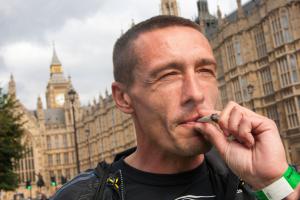People caught with cannabis are almost five times more likely to be charged in some parts of Britain than in others, according to official data.
Official government figures for last year reveal that those living in poorer regions in the north of England and Wales face heavier punishments for the offence of cannabis possession than people living in more affluent areas in the Midlands and south.
Videos by VICE
More than a quarter of those found with cannabis in Cleveland – a region in England’s north east with high levels of deprivation – were charged with possession, compared to less than one in ten people in the country’s richest county, Surrey.
After Cleveland, the police force areas most likely to prosecute those caught holding weed are Humberside, North Wales, Cumbria and Northumbria. Meanwhile Leicestershire, Staffordshire, Thames Valley and Kent followed Surrey in areas least likely to charge.
The maximum sentence for possession of cannabis, a class B drug, is five years in prison. Just 270 of the 15,270 people prosecuted for the offence were jailed in 2019, however all of them will have received a potentially life-changing criminal record that can impact foreign travel and job opportunities.
“Disadvantaged people and those living in deprived areas are more likely to be dealt with harshly when found in possession of drugs and harsher punishments are less likely in areas where people are better off,” said Josh Torrance, a criminologist specialising in drug policing at the University of Bristol.
He said different prosecution rates for those caught with cannabis are also likely to be a reflection of differing local policing methods and priorities, since the Home Office relinquished responsibility to regional police and crime commissioners (PCCs) a decade ago.
Cannabis users across the country were less likely to be charged last year than they were in 2019. One in six of the 98,000 people caught with cannabis in England and Wales between April and December 2020 were charged, compared to one in five between April 2019 to March 2020.
The data also reflects the use by several police forces of quasi-decriminalisation schemes for people caught with cannabis and other drugs. Instead of being dealt with as a criminal, people are given advice and referred to drug workers.
In Avon and Somerset, twice the proportion of people caught with cannabis are put on the force’s drug diversion scheme (28 percent) than are charged (14 percent).
According to the figures, Dyfed-Powys, Merseyside and Durham police forces offered diversion schemes to around one in ten cannabis users they caught. Meanwhile diversion schemes set up recently in North Wales, Thames Valley and the West Midlands are yet to materialise within the Home Office data.
Yet the growing trend by police forces to use diversion schemes for low-level drug possession offences – which resulted in 3,500 people diverted away from a criminal sanction for drug possession in 2019 – is under threat, according to Torrance.
“In the last five years we have seen drug diversion schemes gain considerable momentum. Evidence is emerging from these schemes that give other forces confidence to start putting in place their own schemes.” But he said with Conservatives dominating at elections for local authorities and regional mayors in May, many of the forces with diversion schemes now have a Tory-run PCC.
“We don’t know how they will behave. Already the new Conservative PCC in Cleveland has axed Middlesbrough’s successful heroin assisted treatment project, even though he admitted its results were spectacular, because he said it ‘didn’t deliver from a policing perspective’. Drug diversion schemes could easily lose momentum. With that said, I think the march of progress on reforming how drug possession is dealt with is now unstoppable and we will see drug diversion schemes continue to spread and expand across the UK.”
For the possession of drugs not including cannabis, such as heroin, cocaine and MDMA, Home Office data shows 38 percent were charged, double the rate for cannabis alone.
The Metropolitan Police was the most likely force to charge those caught with personal amounts of non-cannabis drugs, with 61 percent charged, while the least likely were police in Leicestershire, who charged 15 percent.
Avon and Somerset, Durham and Merseyside Police all had above average rates of putting people caught with non-cannabis drugs on diversion schemes rather than give them criminal sanctions.






